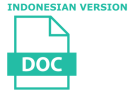Karakteristik Surel Bisnis Berbahasa Korea
Alfiana Amrin Rosyadi(1*)
(1) Universitas Gadjah Mada
(*) Corresponding Author
Abstract
With the increasing number of Korean companies that are doing business in Indonesia, it should be balanced by providing workers who have the ability of understanding business in Korean. One of the required skills is the ability to write a business email. Despite the high demands for researches and books about Korean business, especially on topic of business email in Korea, this has not been considered an important topic in Korean language. Therefore, this research aims to discover and show the characteristics of business email in Korean by dividing it into structural, language, and cultural categories. To obtain the answer, this research has collected 30 emails from a Korean language teaching institution and a Korean manufacturing company. Based on the results, some points have been discussed. First, Korean business email has characteristics based on three categories of business emails. Second, it is also interesting to find out the difference between the language institute and manufacturing company regarding their business fields. These differences must be understood by Korean language learners who want to work in Korean companies in Indonesia or Korea to avoid misunderstanding.
Keywords
Full Text:
PDFReferences
Adobe. (2019). Email Usage - Working Age Knowledge Workers (US Trended Results). https://www.slideshare.net/adobe/2019-adobe-email-usage-study
Brown, P., & Levinson, S. (1987). Politeness : Some Universals in Language Usage. Cambridge University Press.
Damar, W. A. (2010). Cerdas Ber-e-mail: Memaksimalkan Fungsi Surel untuk Komunikasi Online yang Efektif. Gagas Media.
Hanani, I. (2018). Error analysis on Korean honorific usage madeby Indonesian learners. Hankuk University of Foreign Studies.
Hwang, S. (2016). A Study on Indirect Speech Act of Korean learners through Analysis of Morphosyntactic Mitigation. The Korean Society of Bilingualism, 62, 185–208. https://doi.org/10.17296/korbil.2016..62.185
Kallos, J. (2008). Business E-mail Etiquette: The Manual. Lulu Press, Inc.
Kim, A. (2012). Trading related E-mail Discourse Analysis for Korean Teaching. Korea University.
Kim, J. (2018). E-mail Text Analysis for Business E-mail Writing Techniques Teaching. Korea University.
Lee, Y. (2015). Developing educational materials for Korean for business purposes through email discourse analysis. The Society of Chung-Ang Language & Literature, 61, 539–561. https://doi.org/10.15565/jll.2015.03.61.539
Linyan, M. (2020). A Study on the Request Strategy Based on the Situation of Business Email. Seoul National University.
Myeong, D. S. (2019). Work Ethic in Company for Dummies. Fandombooks.
Rosyadi, A. A. (2019). A Study on the Use of Downgraders by Indonesian Intermediate Learners of Korean Language. Ewha Womans University.
Searle. (1979). Expression and meaning. Cambridge University Press.
Smith, L. A. (2002). Business E-mail: How to Make it Professional and Effective. Writing and Editing.
Xin, L. (2018). Korean Business E-mail Communication Educational Content Research: Mainly with Linguistic and Cultural Differences among Korea and China. Ewha Womans University.
Article Metrics
Refbacks
- There are currently no refbacks.
Copyright (c) 2020 The Author(s)

This work is licensed under a Creative Commons Attribution-ShareAlike 4.0 International License.







